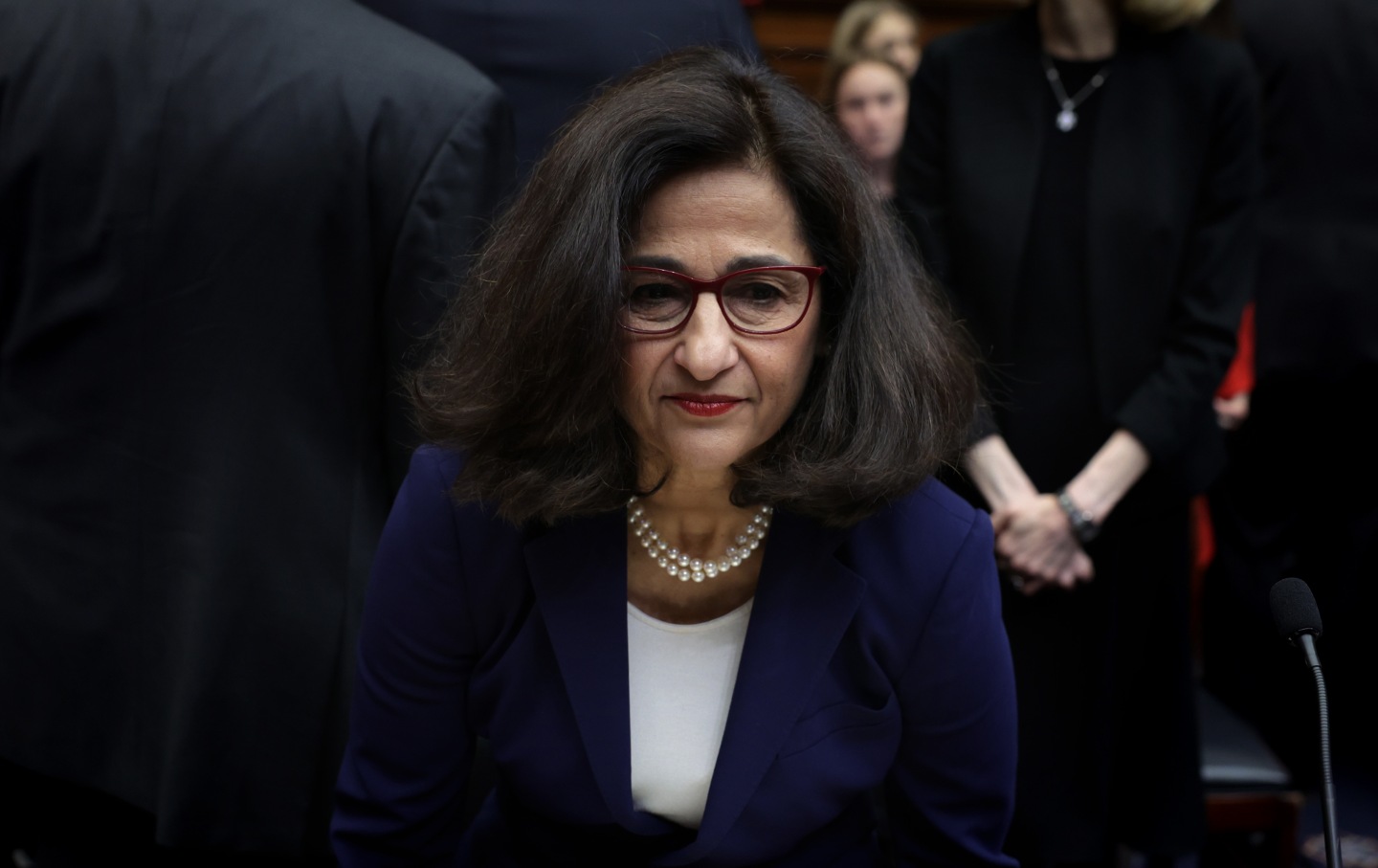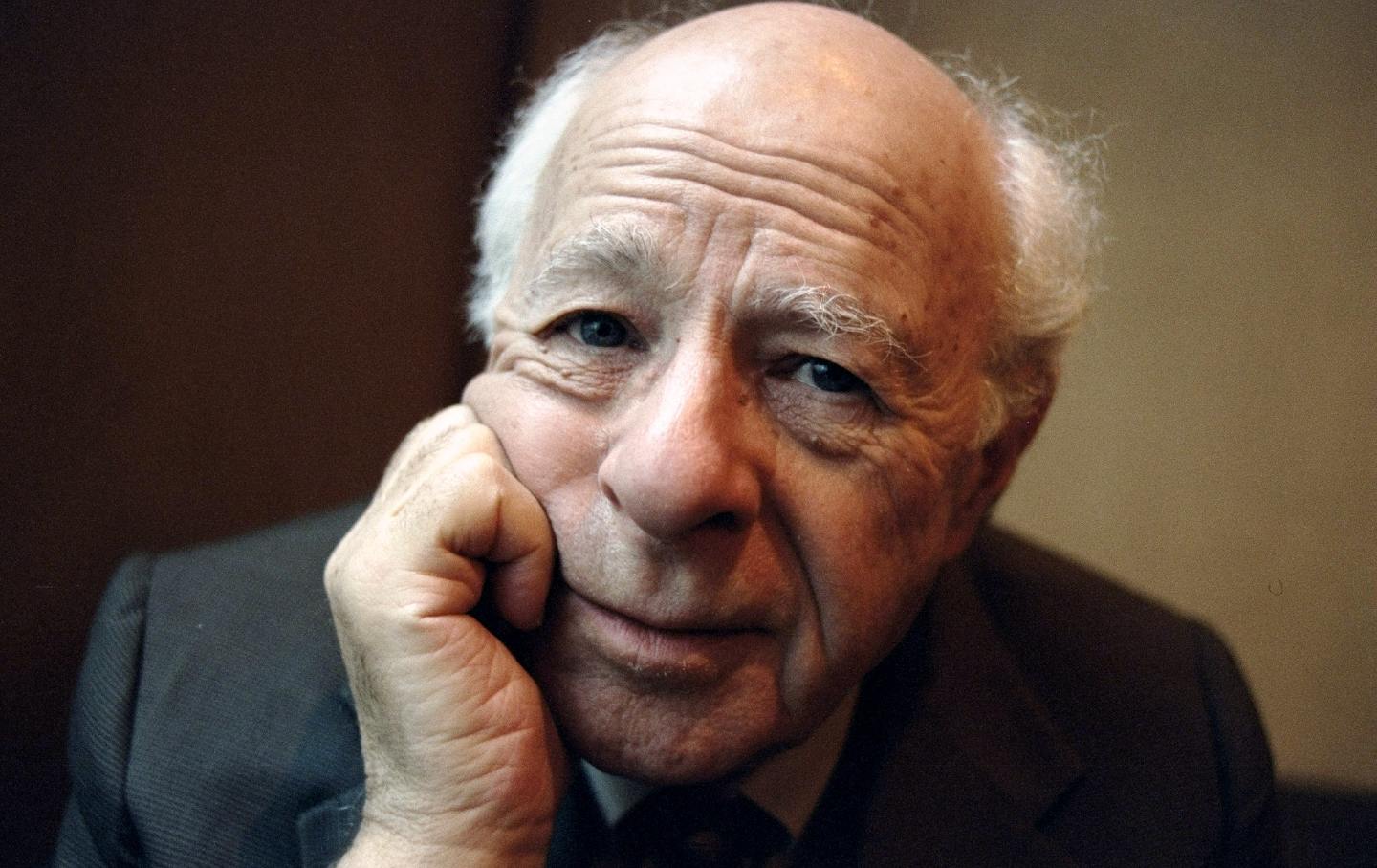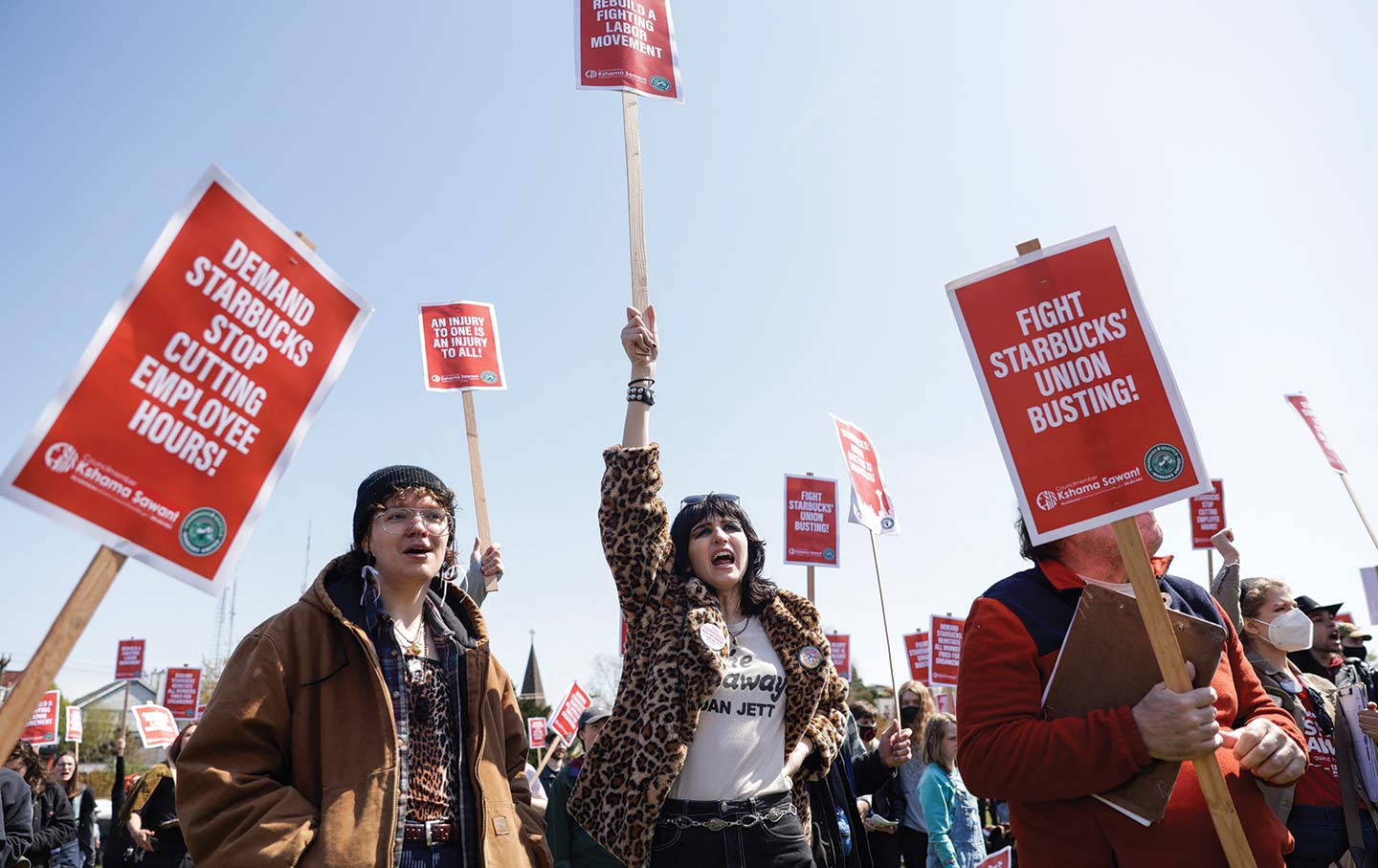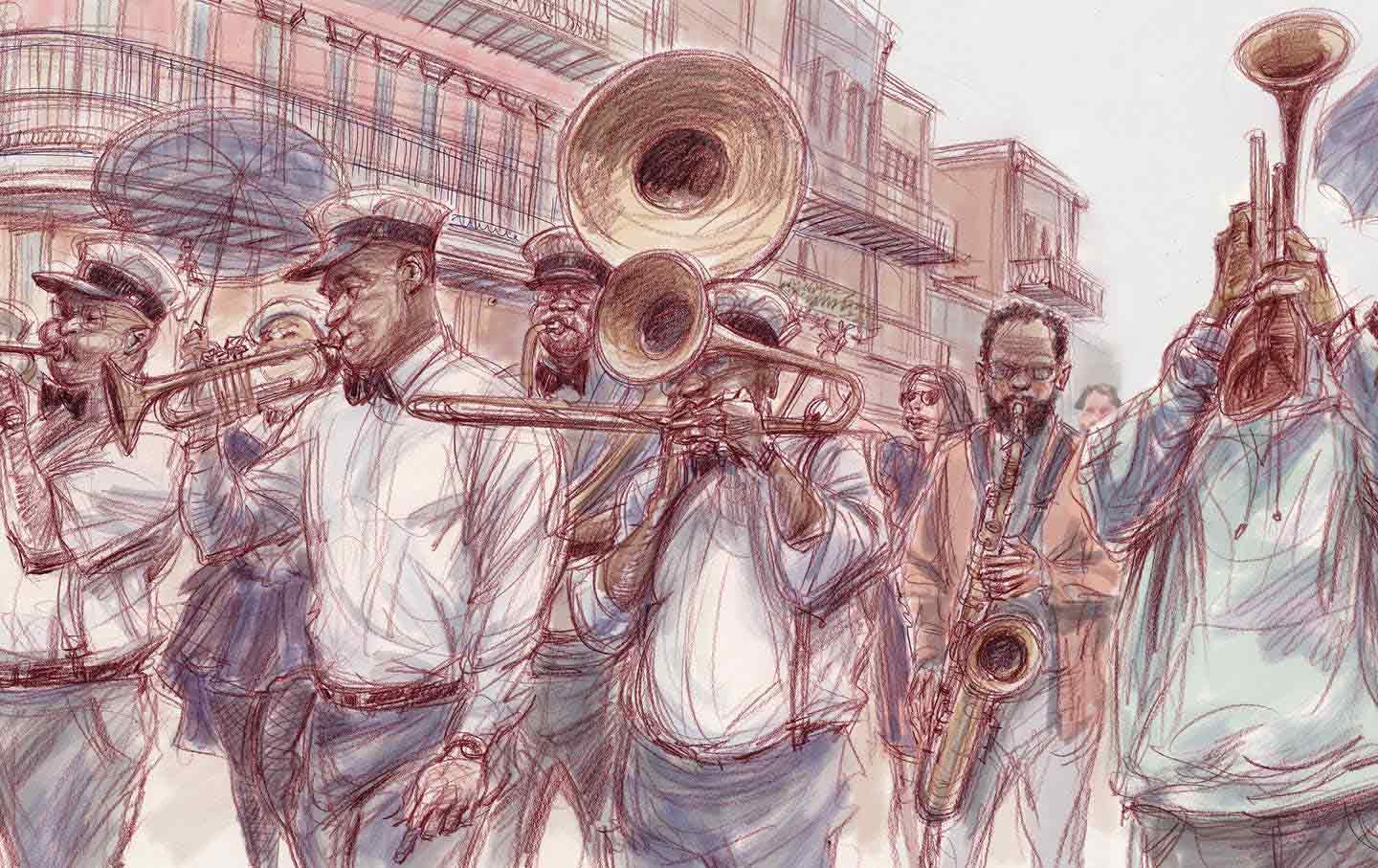Good Riddance, Minouche Shafik
How the now-former Columbia University president betrayed her students, destroyed her credibility, and disgraced her office.

Former Columbia University president Nemat “Minouche” Shafik arrives at a hearing before the House Committee on Education & the Workforce at Rayburn House Office Building on April 17, 2024, in Washington, DC.
(Alex Wong / Getty Images)Last week, just before the fall semester was set to begin, Columbia University President Nemat “Minouche” Shafik announced that, after only one year in the role, she would be stepping down effective immediately.
Shafik alluded to a “period of turmoil” that had taken a “considerable toll” on her family. She didn’t mention the sources of that turmoil, or reflect on how she may have disappointed the school community she was supposed to serve. But it was not hard to read between the lines.
No university leader was more associated with the brutal nationwide crackdown on the Gaza solidarity encampments that spread from Columbia to campuses around the world. Shafik’s decision to unleash the NYPD on her own school destroyed her credibility forever.
From last August to this May, I was a master’s student at Columbia Journalism School. I saw Shafik’s entire stint up close. So I know that it’s too easy to confine the story of her demise to this spring’s protests. Instead, you have to look at the whole of her brief, terrible tenure to understand why she’s gone.
On October 4, 2023, Shafik was sworn in as Columbia’s 20th president on the steps of Low Library. She was the university’s first woman and first Arab president, and many students greeted her arrival with enthusiasm. But there were signs of trouble right away. Shafik’s inauguration was overshadowed by multiple protests, from graduate students picketing for fairer wages to a group demanding that the school take real accountability for its role in helping protect Robert Hadden, a Columbia-affiliated gynecologist who sexually abused his patients for decades, from justice.
When Shafik and Columbia University Irving Medical Center CEO Katrina Armstrong (who will now serve as interim president) released a statement about Hadden in September, survivors of Hadden’s abuse immediately rejected it. The victims said that Shafik never personally reached out to them or their lawyer, and that the school was prioritizing wealthy donors over “taking account of the betrayal that Columbia University has committed.” This would become a consistent throughline of Shafik’s presidency.
The October 7 attacks took place just three days into Shafik’s term. On October 9, she released the first in what would become a series of offensive, purposefully vague statements about Israel and Palestine. She said she was “devastated by the horrific attack on Israel,” but made no explicit mention of the attacks on Gaza, referring only to “the situation in Israel and Gaza” and “violence that is affecting so many people.” Not once in in her “Message of Concern for Our Community” did Shafik directly refer to Palestinian, Arab, or Muslim students at Columbia, or the pain and grief they were experiencing.
Students who had welcomed Shafik’s arrival just days before felt deeply betrayed.
“I recently came across a video in my camera roll from when she took the stage as part of her inauguration celebration on October 4th—in it, I’m cheering and I yell out, ‘Ahlan wa Sahlan,’ which means ‘welcome’ in Arabic,” said Maryam Alwan, a Palestinian student at the university. “A mere week later, my camera roll transitions to a photo of a protester holding a sign that says ‘Shame on you, Shafik,’ in Arabic.”
Alwan said that the statement was particularly painful because it came from an Arab woman. “Shafik’s utter disregard for Palestinians in her initial communications was only the beginning of a nightmare from which I’m still trying to wake up,” Alwan describes. “She has taught me that having minorities in positions of power is meaningless if they have no morals or are so willingly beholden to the interests of those who do not see us as human—and ultimately, her capitulation did not save her either.”
The last time I saw Columbia’s hallowed Alma Mater statue without fencing around it was October 18, when I reported on a vigil for Palestinians after the death toll in Gaza had passed 3,000 people.
I vividly remember a student from Gaza whose voice cracked as she said she wished she could be back with her family — that she would have rather died with them than stay in America alone. She described how alone she felt on campus, and how dehumanized she felt in class. This was what Shafik and the rest of the school’s leadership had fostered in just a few weeks: an atmosphere of intimidation and isolation.
From then on, campus entrances would frequently be closed, often with no reason given other than “Due to Demonstration,” which almost always meant there was a pro-Palestine protest expected. NYPD officers became a more frequent sight on campus. It was as though Shafik had created a mini surveillance state at Columbia. Black and brown students felt particularly unsafe because of it.
Popular
“swipe left below to view more authors”Swipe →On November 10, one day after Columbia Students for Justice in Palestine and Jewish Voice for Peace set up a peaceful art installation on the steps of Low Library to mark the killing of 10,000 Palestinians in Gaza, Shafik bypassed student governing procedures and suspended both groups through the fall semester. Columbia accused the groups of having “repeatedly violated University policies related to holding campus events, culminating in an unauthorized event.”
According to a letter from the New York Civil Liberties Union, which is suing Columbia, this decision was a substantial departure from the university’s established procedures for engaging with and sanctioning groups—one motivated by political animus.
“By publicly pronouncing the students’ November 9 conduct as ‘threatening’ and ‘intimidating,’ the university perpetuated already pervasive and dangerous stereotypes about Palestinians, Arabs, Muslims, and individuals—particularly other people of color—who advocate for Palestinian rights in general.”
When students returned to campus in the spring, the hope was that because the suspension was lifted, protesting within the walls of their own school would be easier. Instead, it got worse.
On January 19, I was outside Low Library photographing student protesters as they huddled together, holding signs and protesting the bombing of Gaza and Yemen. It was snowing heavily that day, and after an hour or so of reporting, I left. Had I stayed any longer, I would have been among the students who got sprayed in a chemical attack. Protesters said they smelled something putrid on their clothes after dispersing, which was later identified as “Skunk” an Israeli-developed chemical weapon, tested and used routinely on Palestinians in the West Bank.
The attack was reportedly perpetrated by two Columbia School of General Studies students who formerly served in the Israeli Defense Forces. It took Shafik’s administration more than three days to finally issue a statement, after public pressure, about the attack, which led to the hospitalization of eight students.
For the next three months, there were repeated calls from SJP and JVP for Shafik to step down, both online and in person, with “Minouche Shafik you can’t hide, you’re supporting genocide!”
But in April, things reached a boiling point. On the morning Shafik was set to testify before Congress, students set up the first of their three encampments on the South Lawn and something changed. To someone who had reported on almost every protest since October, things felt different. And they were: For the first time, Shafik and her administration could not look away or quietly sweep things under the rug.
“Though Shafik refused to meet with protestors for months, I ended up being one of the only Palestinian students she ever ended up speaking with,” Alwan said. “I met with her in a group setting on April 8th, and it was largely fruitless and disingenuous. The last thing she said to me was, ‘Take care of yourself.’ A week later, she arrested me and over 100 other students for sitting on the grass with Palestinian flags.”
I also believe that this autonomous student action, which quickly became a global movement, was the first time Shafik realized she may not be ousted by politicians accusing her of antisemitism but rather because of popular protest from her own students. Every move she made from that point on was baffling: from inviting the NYPD to arrest students at the first encampment, to ignoring her own faculty’s vote of no-confidence, to sending out letters threatening suspension to anyone who refused to leave the second encampment, to, of course, how she handled the takeover of Hamilton Hall.
The night of April 30 is permanently burned in my memory and, I’m sure, that of anyone else who was on campus. That night, we received an alert that police vehicles from the strategic response group were approaching the campus. We all rushed out, professors included, to stand ready to photograph, film, and write about everything that was soon to happen. Protesters linked arms and sang in front of the building they took over the night before—one they had renamed “Hind’s Hall,” in honor of 6-year-old Hind Rajab, one of more than 16,000 Palestinian children killed by the Israeli military in Gaza. The students protected the building with their bodies, despite the force that they knew was coming.
Not only did Shafik authorize hundreds of officers to brutally arrest her students; she also prevented all of us in the press from doing our jobs. Student reporters, including graduates at the journalism school, members of the undergraduate student newspaper The Columbia Daily Spectator, and correspondents at the radio station WKCR, were kettled outside the campus gates or into the journalism building where we could not see anything that was happening. None of us thought it was a coincidence that Shafik waited until it got dark to call in the police, and that we weren’t allowed back in to report until well after all of the arrests.
In the days that followed, student reporters routinely had our access to campus denied. If we wore our press passes, we were told by campus security that “no press is allowed in,” and if we held up our campus IDs, we were told we “weren’t essential personnel.” Shafik and her administration sought to make reporting on this story almost impossible, and in doing so, violated the fundamental rights of the press.
In her resignation letter, Shafik noted that “It has been distressing—or the community, for me as president and on a personal level—to find myself, colleagues, and students the subject of threats and abuse.” But she has yet to come to terms with the fact that many of her students, Palestinian and Jewish alike, did not just face “threats”: They faced actual violence, including violence instigated by her. Members of SJP and JVP spent the year getting doxxed, faced harassment and ridicule on campus with no protection from the administration, and ultimately experienced police brutality because she signed off on it.
“When I think of Shafik in the years to come, the images that will flash in my mind will be of bloodied students dragged out in handcuffs amid screams, of hundreds of armed riot cops storming campus in the dark, of locked gates devoid of community within, and of the blood spilled in Gaza with weapons she refused to cease investing in at all costs,” Alwan told me.
Shafik said that she will be accepting a role with the UK’s foreign secretary, “to chair a review of the government’s approach to international development.” It is an interesting choice given her total failure to handle international issues within the confines of just one campus.
When I asked Alwan whether she saw Shafik’s resignation as a victory for the movement, her answer was layered. “Though I personally feel happy that someone so directly responsible for the pain of so many in our community will no longer share the halls with us, I recognize that she is merely the figurehead of deep institutional rot,” she said. “I hold no illusions that wiping the slate clean now will serve as anything other than a deflection tactic for what is likely to be an enduring struggle.
And Alwan had a message for Shafik’s successor. “I hope that interim president Armstrong will learn from the mistakes of her predecessor,” she said, “and understand that the student movement will not only last until divestment from the apartheid state, but also grow tenfold with each repressive move.”
Disobey authoritarians, support The Nation
Over the past year you’ve read Nation writers like Elie Mystal, Kaveh Akbar, John Nichols, Joan Walsh, Bryce Covert, Dave Zirin, Jeet Heer, Michael T. Klare, Katha Pollitt, Amy Littlefield, Gregg Gonsalves, and Sasha Abramsky take on the Trump family’s corruption, set the record straight about Robert F. Kennedy Jr.’s catastrophic Make America Healthy Again movement, survey the fallout and human cost of the DOGE wrecking ball, anticipate the Supreme Court’s dangerous antidemocratic rulings, and amplify successful tactics of resistance on the streets and in Congress.
We publish these stories because when members of our communities are being abducted, household debt is climbing, and AI data centers are causing water and electricity shortages, we have a duty as journalists to do all we can to inform the public.
In 2026, our aim is to do more than ever before—but we need your support to make that happen.
Through December 31, a generous donor will match all donations up to $75,000. That means that your contribution will be doubled, dollar for dollar. If we hit the full match, we’ll be starting 2026 with $150,000 to invest in the stories that impact real people’s lives—the kinds of stories that billionaire-owned, corporate-backed outlets aren’t covering.
With your support, our team will publish major stories that the president and his allies won’t want you to read. We’ll cover the emerging military-tech industrial complex and matters of war, peace, and surveillance, as well as the affordability crisis, hunger, housing, healthcare, the environment, attacks on reproductive rights, and much more. At the same time, we’ll imagine alternatives to Trumpian rule and uplift efforts to create a better world, here and now.
While your gift has twice the impact, I’m asking you to support The Nation with a donation today. You’ll empower the journalists, editors, and fact-checkers best equipped to hold this authoritarian administration to account.
I hope you won’t miss this moment—donate to The Nation today.
Onward,
Katrina vanden Heuvel
Editor and publisher, The Nation
More from The Nation

The Longest Journey Is Over The Longest Journey Is Over
With the death of Norman Podhoretz at 95, the transition from New York’s intellectual golden age to the age of grievance and provocation is complete.

Breaking the LAPD’s Choke Hold Breaking the LAPD’s Choke Hold
How the late-20th-century battles over race and policing in Los Angeles foreshadowed the Trump era.

Mayor of LA to America: “Beware!” Mayor of LA to America: “Beware!”
Trump has made Los Angeles a testing ground for military intervention on our streets. Mayor Karen Bass says her city has become an example for how to fight back.

Organized Labor at a Crossroads Organized Labor at a Crossroads
How can unions adapt to a new landscape of work?

The Epstein Survivors Are Demanding Accountability Now The Epstein Survivors Are Demanding Accountability Now
The passage of the Epstein Files Transparency Act is a big step—but its champions are keeping the pressure on.

The Fight to Keep New Orleans From Becoming “Everywhere Else” The Fight to Keep New Orleans From Becoming “Everywhere Else”
Twenty years after Katrina, the cultural workers who kept New Orleans alive are demanding not to be pushed aside.


